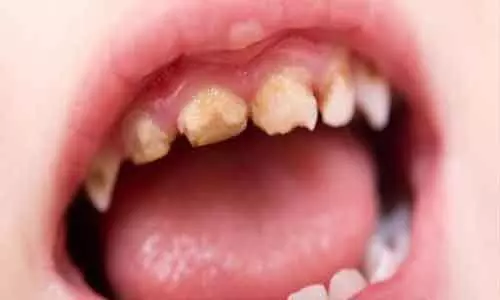Chemical Found In Drinking Water Linked To Dental Caries In Children
 Researchers at West Virginia University School of Dentistry have found that children with higher concentrations of a certain chemical in their blood are more likely to get cavities. They conducted research to determine the association of seven perfluoroalkyl and polyfluoroalkyl substances versus dental caries experience in US children, ages 3–11 years.
Researchers at West Virginia University School of Dentistry have found that children with higher concentrations of a certain chemical in their blood are more likely to get cavities. They conducted research to determine the association of seven perfluoroalkyl and polyfluoroalkyl substances versus dental caries experience in US children, ages 3–11 years.
Manufactured chemical groups called perfluoroalkyl and polyfluoroalkyl substances are universal as a result of extensive manufacturing and use. Although manufacturers no longer use PFAS to make nonstick cookware, carpet, cardboard, and other products, they persist in the environment. Scientists have linked them to a range of health problems--from heart disease to high cholesterol--but now R. Constance Wiener and Christopher Waters are exploring how they affect dental health.
They investigated whether higher concentrations of PFAS were associated with greater tooth decay in children. One of them--perfluorodecanoic acid--was linked to dental cavities. Their findings appear in the Journal of Public Health Dentistry.
"Due to the strong chemical bonds of PFAS, it is difficult for them to breakdown, which makes them more likely to be persistent within the environment, especially in drinking water systems," said Waters, who directs the School of Dentistry's research labs. "A majority of people may not be aware that they are using water and other products that contain PFAS."
The 629 children who participated in the study were 3 to 11 years old and were part of the National Health and Nutrition Examination Survey. Samples of the children's blood were analyzed for PFAS in 2013 and 2014. Their tooth decay and other factors--such as their race, their BMI and how often they brushed their teeth--were assessed.
Of the seven PFAS that Wiener and Waters analyzed, perfluorodecanoic acid was the one that correlated with higher levels of tooth decay.
"Perfluorodecanoic acid, in particular, has a long molecular structure and strong chemical bonds; therefore, it remains in the environment longer. As a result, it is more likely to have negative health consequences such as dental caries," said Dr. Wiener, an associate professor in the Department of Dental Practice and Rural Health.
But how does that influence happen? Wiener and Waters have a hypothesis. According to other research, perfluorodecanoic acid may disrupt the healthy development of enamel, which is what makes teeth hard. That disruption can leave teeth susceptible to decay.
However, when it comes to cavities, scientists haven't parsed perfluorodecanoic acid's mechanism of action yet. The topic warrants further investigation......................
0 Comments:
Post a Comment
<< Home